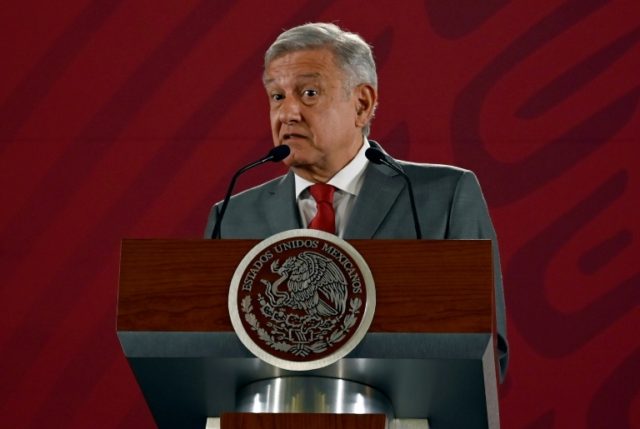Mexico City (AFP) – Despite calling himself a champion of migrants’ rights, Mexican President Andres Manuel Lopez Obrador has actually stepped up detentions of Central Americans crossing Mexico — just not enough to please Donald Trump.
Mexico’s leftist leader scrambled to defend his migration policies Friday after Trump blew up neighborly relations by announcing he would impose tariffs of five percent — rising to 25 percent by October — on all Mexican goods “until the Illegal Immigration problem is remedied.”
“We are doing our job,” Lopez Obrador replied.
The anti-establishment politician has gotten a rude wake-up call on the migration issue since sweeping to office in December after a landslide election win.
He initially vowed to break with Mexico’s past by warmly welcoming Central American migrants fleeing violence and poverty.
His government offered humanitarian visas rather than detaining them, providing access to health services and education during their stay in Mexico.
But as the flow of Central Americans trekking toward the United States has continued to surge — drawing threats from Trump to close the border and, now, impose tariffs — Lopez Obrador has had to change his game plan, if not his stump speech.
– Visa restrictions, detentions –
Lopez Obrador still talks of welcoming migrants and safeguarding their rights.
But his actions on the ground have taken a hardline turn.
“There’s an inconsistency between the narrative and the reality,” said Leticia Calderon of the Mora Institute in Mexico City.
An initial lull in migrant detentions under Lopez Obrador’s administration was followed by a surge: from January to April this year, Mexican authorities detained 51,607 migrants, a 17-percent increase from the same period in 2018.
When more than 13,000 migrants applied for humanitarian visas in less than two weeks, the government suspended the program.
Instead, it now gives migrants visas that restrict them to the south of the country, far from the US border.
Originally designed for Central Americans making short visits to southern Mexico for activities like shopping, these “regional visitor visas” are now applied to Africans, Cubans and Haitians as well.
Migrants have not taken kindly to the new policies. They have rioted several times in recent weeks in the euphemistically named “shelters” where the authorities hold them.
Cubans, in particular, have taken umbrage, breaking out of shelters en masse at least six times since March.
“Lopez Obrador opened his mouth too soon,” said international relations expert Javier Urbano at the Iberoamerican University in Mexico City.
“Promising a total overhaul of migration policy in a matter of weeks was completely out of touch with reality.”
Mexican migration policy, he added, “continues to be based primarily on containment and repression.”
Nevertheless, migrant detentions at the US southern border continue to rise: in April, border officers apprehended a new record of 58,474 people who crossed in family groups.
– Drugs: another sticky issue –
Lopez Obrador’s big idea to stop migration is a 10-year economic development plan for Central America and Mexico that he says will wipe out the root causes of the exodus.
He wants the US to contribute a major part of the $10 billion-a-year budget, and his administration had been in talks with White House officials to that end.
But then Trump lashed out with tariffs over the migration issue — and doubled down Friday by saying Mexico also needed to stop drug trafficking into the US if it wanted the tariffs lifted.
Lopez Obrador is also in a sticky situation on drug trafficking.
He has declared an end to the bloody “war” that previous governments waged on the country’s powerful drug cartels, the main suppliers to the US.
But he has also launched a new, militarized National Guard to fight crime, drawing criticism from human rights groups and disappointing some supporters.
As with migration, he appears powerless to stop the problem: the wave of cartel-fueled violence sweeping Mexico has only gotten worse, and this year is on track to break last year’s record of 33,500 murders.

COMMENTS
Please let us know if you're having issues with commenting.